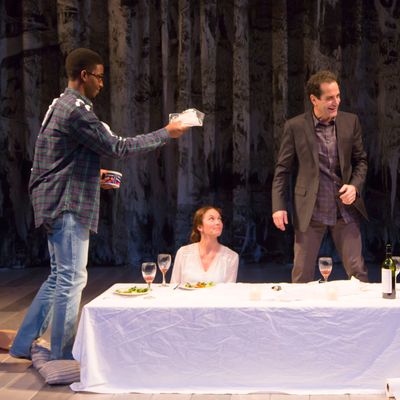
A new play that reads very well on the page risks getting staged above its station. Sad to say, The Mystery of Love & Sex, by Bathsheba Doran, is that kind: engrossing in theory, a botch in practice. Commissioned by Lincoln Center Theater and given a top-flight production there, it might, ironically, have benefited more from shabbier treatment, a process that could have revealed its substantial flaws while there was still time and freedom to do something about them. But when you’ve got Tony Shalhoub and Diane Lane engaged to play two of the four leading characters, and Sam Gold directing, plus all the professional polish LCT typically provides, there’s not much to be done but leave the audience to enjoy what it can and wish the rest were better.
There’s no mystery why such talents were drawn to the material. Shalhoub and Lane have meaty roles as Howard and Lucinda, a mismarried couple heading for the rocks; he’s a nervous New York Jew known for writing detective fiction, she’s a rebellious Southern belle. The attention they might more profitably pay to their own bad behavior they instead lavish on Charlotte, their college-age daughter, who is as narcissistic as they are but at least has the excuse of youth. Her tiresome exploration of her sexuality — Gender Studies, you have a lot to answer for — is not, however, what concerns them. In fact, they barely notice it, troubled as they are by what they take to be her deepening relationship with Jonny, the boy next door who was her childhood best friend and now attends the same college as she does. So what’s the problem? Jonny is sweet, smart, respectful, ambitious, abstemious, a “cutie-pie” — and black. When, in a funny but overfamiliar opening scene, the parents arrive at the kids’ dorm for the requisite Awkward Visit, he might as well be Sidney Poitier in a semi-reversed Guess Who’s Coming to Dinner.
If Howard can barely stomach the politically correct salad Charlotte and Jonny have prepared, Shalhoub makes a meal of his discomfort and disowned disdain. (His physical comedy is superb.) Lane, gorgeous and wily, is just as smart to underplay. As the kids, Gayle Rankin and Mamoudou Athie obviously enjoy chewing on characters who do not, at first, reveal everything — even to themselves. (Jonny and Charlotte, despite their closeness, have predictably parallel secrets.) But just because a role is meaty doesn’t mean it’s muscly; interactions that begin promisingly enough almost always collapse within moments under the unsupported weight of too much unshaped interestingness. Unshaped and unconvincing. Barely a moment after Charlotte tells Jonny about falling in love with a butch girl on campus, she’s pleading with him to have sex with her on the table among the remains of the salad. Later, in a reciprocal gesture provoked only by the playwright, Jonny strips naked for Charlotte — at a wedding. It’s not that real people aren’t contradictory and rash; they’re just not generally that way all the time and all the way. Watching this quartet explode and carom, though, you have to conclude either that the characters are psychotic, and thus basically useless as expressive vehicles, or that the play is.
Which is not to suggest that Doran, who’s a producer and writer on Showtime’s Masters of Sex, has nothing to say; she probably has too much. Indeed, to get to each of her riffs, she’s willing to divert the intended realism of the storytelling around incidents she throws in the roadway like boulders. Among the unlikely plot points are a threatened slander lawsuit, a deus ex eBay, and a credible work of academic literary criticism. (Jonny finds Howard’s novels racist and writes a paper about it.) But for all this action there are strangely few themes, or perhaps it’s better to say that the actions and themes are unrelated. That race card, for instance, is frequently played, and yet race is not, in the end, meaningfully addressed. Nor does The Mystery of Love & Sex have much to say about family, no matter how much of the dialogue is spent on it.
With all the subjects knocked about everywhere, it’s hard to see what’s left standing after two and a half hours. If the play is about anything, it’s the subject announced by that vague and dull title — and only in exploring its “mystery” does Doran pull her ideas and actions together enough to be moving. There’s drama in the way the characters, hobbling toward mature love, use each other as temporary crutches, as if adolescence were a horrible accident from which everyone (whether kid or adult) is always recuperating. Unfortunately, that drama is swamped by a discursive style that sounds to my ear more apt for television. It may not be true that (as Jonny says defensively) “the only way to be truthful is to say nothing at all,” but I wish The Mystery of Love & Sex had been given more of a chance to test the theory.
The Mystery of Love & Sex is at the Mitzi E. Newhouse through April 26.




